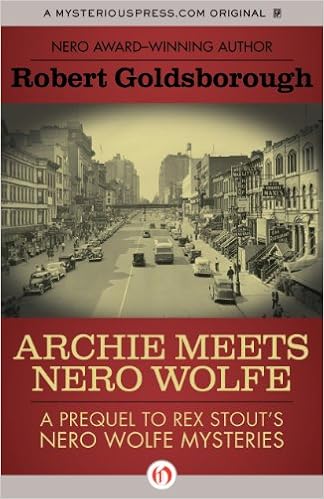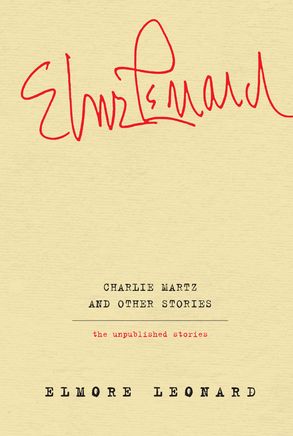
First, about that title. Stephen Stimson lives in Bellingham, as do I. (In fact, he coined our unofficial municipal slogan: the City of Subdued Excitement.) Mr Stimson used to run a store called Lone Wolf Antiques, and one day I strolled by and saw the entire front window of the shop covered by a piece of brown paper bearing the remarkable words of today's title. And that's all the explanation you are going to get from me.
 Now
for the main topic. Lawrence Block was recently interviewed
by Tripwire Magazine and I recommend you go to his site and read
the whole thing. It's all
great, but there was one piece that caught my attention in particular.
Now
for the main topic. Lawrence Block was recently interviewed
by Tripwire Magazine and I recommend you go to his site and read
the whole thing. It's all
great, but there was one piece that caught my attention in particular.The interviewers brought up the Leo Haig novels, Block's pastiche of Rex Stout's Nero Wolfe books. Then they asked if he had read Robert Goldsborough's novels, authorized continuations of the Nero Wolfe series. Here is his reply:
I read two early on and didn’t care for them. I gather he’s improved some, and makes a good job of writing like Stout. But, you see, there’s the thing in a nutshell; Stout didn’t try to write like Stout.
 As I recall I stomped my feet and shouted: "Exactly!"
As I recall I stomped my feet and shouted: "Exactly!" I'm not here to pick on Mr. Goldsborough, or Ace Atkins, Ann Hillerman, Felix Francis, or anyone else who has inherited a franchise. What I am reaching for is this: I get uncomfortable when a young writer is advised to try copying someone else's style. I can understand doing it as an exercise, or for a pastiche, but keep it up too long and it can only stunt your growth. Rex Stout was trying to find his own voice, not copy someone else's.
I recently read a book by Elmore Leonard called Charlie Martz and Other Stories. They are previously unpublished, and you can understand why Leonard chose to keep them that way. Most of them are interesting primarily as a peek into the laboratory, a chance to watch Leonard looking for his voice. (Compare them to the tales in When The Women Came Out To Dance, stories he wrote when he was at the top of his form.) You can see a glimpse here and a touch there of Leonard, but he wasn't quite there yet.
 I would be happy to hear what you have to say about this
subject but before we get to the comments, there is one more detail.
When I told my wife about Block's remarks she smiled and said
"Zusya."
I would be happy to hear what you have to say about this
subject but before we get to the comments, there is one more detail.
When I told my wife about Block's remarks she smiled and said
"Zusya."Zusya was a Hasidic rabbi in the nineteenth century. He was apparently a "wise fool," like Nasrudin, Diogenes, or Saint Francis, a spiritual leader or philosopher who (deliberately?) behaved eccentrically in order to get his lessons across. What follows is the most famous story about him. There are many versions, but this is the one I heard first.
One day Zusya's followers came into his study and found him hiding under the desk, weeping and shaking with fear. "I have just learned the question I will be asked by the angel of death when I die. And I am terribly frightened because I cannot answer it!"
"Rabbi," said the followers, "you are good man, and a wise man. What could death ask you that is so terrifying?"
"I thought he might ask: 'Zusya, why were you not Moses, to lead your people to the promised land?' I could have answered that! Or he could ask 'Zusya, why were you not David, to fight your people?' I could answer that. But, no! What he is will ask is: 'Zusya, why were you not Zusya?'"
I agree with all of your points, Rob. And one thing that bugs me is when someone else takes over another authors work/character I never quite believe it. How do I know that's what the creator-author would have wanted? So unless they're finishing a work-in-progress that didn't get done because the author died, they're really just creating from whole cloth. And we don't know where the creator would have gone. There's been "sequels" written to Casablanca and Gone With the Wind. A book and movie that don't need sequels. But assuming the original creators would have done something maybe what was done wasn't what they would have done. Anyway, that always bothers me. -- And sorry if this is incoherent a bit, I can hardly keep my eyes open right now.
ReplyDeleteAs for what the author wanted, we know in one case. Rex Stout was asked and he said the authors shoudld "roll their own," meaning not use his characters. Larry Block, in the interview, said hewould prefer that no one continue his characters, but added that after he died he doubted thathe would care.
ReplyDeleteYesterday, I drove by a bookstore with a big sign out front: "We have the new books by Harper Lee and Dr. Seuss!" It seemed ironic that the hottest new books around aren't exactly "new" and may not exactly be "by" the famous authors credited on the covers. There's something timid, I think, about trying to force one more book out of the pages of a writer who stopped writing long ago--the same sort of timidity that leads to trying to extend series after the writers who created them have died, or producing endless movie sequels, or making movies based on old television shows. Creating something truly new is risky--there's no guarantee of success--so we cling to something that has already proven successful and try to keep it going. That approach often does seem to guarantee some built-in sales; whether or not it often guarantees other sorts of success is, obviously, an open question.
ReplyDeleteGreat column, Rob. I agree on all points.
ReplyDeleteAnd well said, Pau! Bonnie, too. My feelings exactly. I haven't tried to figure up how many new releases are sequels, prequels, remakes, or series extensions by different authors, but certainly there are (too) many.
Make that Paul!, not Pau!
ReplyDeleteStyle is an intangible and yet good writers have a distinct sense of it. The work doesn't have to be in the first person either. It's unique to a good writer just as voice is.
ReplyDeleteI agree 100% - when I want to read Nero Wolfe, I read Rex Stout; when I want to read James M. Cain, I read James M. Cain; Sherlock Holmes? Arthur Conan Doyle. The voice, the style, the quirks are all individual to the author, and that's what I want. It's like when someone you love dies - do you go out and replace them with someone who's kind of a duplicate? Maybe, if it's a pet, but I don't even do that. I think it's better if you fall in love all over again with someone completely new and different.
ReplyDeleteI shared the story about the rabbi on my Facebook page, citing you and linking to your column. It's terrifying, inspiring, and deeply moving. Thank you!
ReplyDeleteI strongly feel that characters created by authors should not be turned over to someone else. It doesn't work for me. Sherlock Holmes has probably suffered this indignity more than any other. I admit I am guilty of this one. In my case, however, it was a parody--and a broad one--with no attempt to be anything more.
ReplyDeleteNero Wolfe, Hercule Poirot, Father Brown, et al, should die with their creators. And for heaven's sake, do NOT make a sequel to Casablanca!
Thanks all, especially anon for the repost. Uears ago I tried to distinguish between parody, pastiche, and what I now call fan fiction. See http://criminalbrief.com/?p=8047
ReplyDeleteHi, everyone (most of whom I know from Shortmystery).
ReplyDeleteI agree it's all too easy for beginning writers to get caught up in copying their idols, but I don't mind established writers continuing well-known series. While the publisher's motive is mostly profit, the continuation author's motive is often born of his or her admiration for the original author and a desire to see beloved characters live on. To me, continuation compliments a legacy, doesn't tarnish it.
I agree there's nothing like an original author's work, but I've also enjoyed the movies and continuation novels that stemmed from, say, Ian Fleming's James Bond. Fan demand has caused the Bond movies to outlive Fleming. He wrote twelve Bond books and two short story collections. Who are one group of fans to say it all should have stopped with his death, no more movies made, or books written for other fans?
Characters grow to belong as much to their audience as they do their creators. Most creators give their characters the capacity to go on as long as their audience grows, well beyond one lifetime, optimistically. And, amid their materialism, new books and movies give new generations of fans an appreciation for the original.
I have never taken to any of the continuation books. I read one for an author I won't name and I put the book down after ten pages. Whether the continuing writer meant it or not, the book was a parody of the original. No one else is going to think like Doyle or Parker or Francis (though his son, Felix, can get away with more than anyone else). Finding your voice in writing is the hardest part, and finding a story that is true to you is the next hardest part. And then trying to persuade a publisher that such a voice and story will be better than another Rex Stout or Agatha Christie is almost impossible. We're losing our ability to recognize and embrace originality.
ReplyDelete